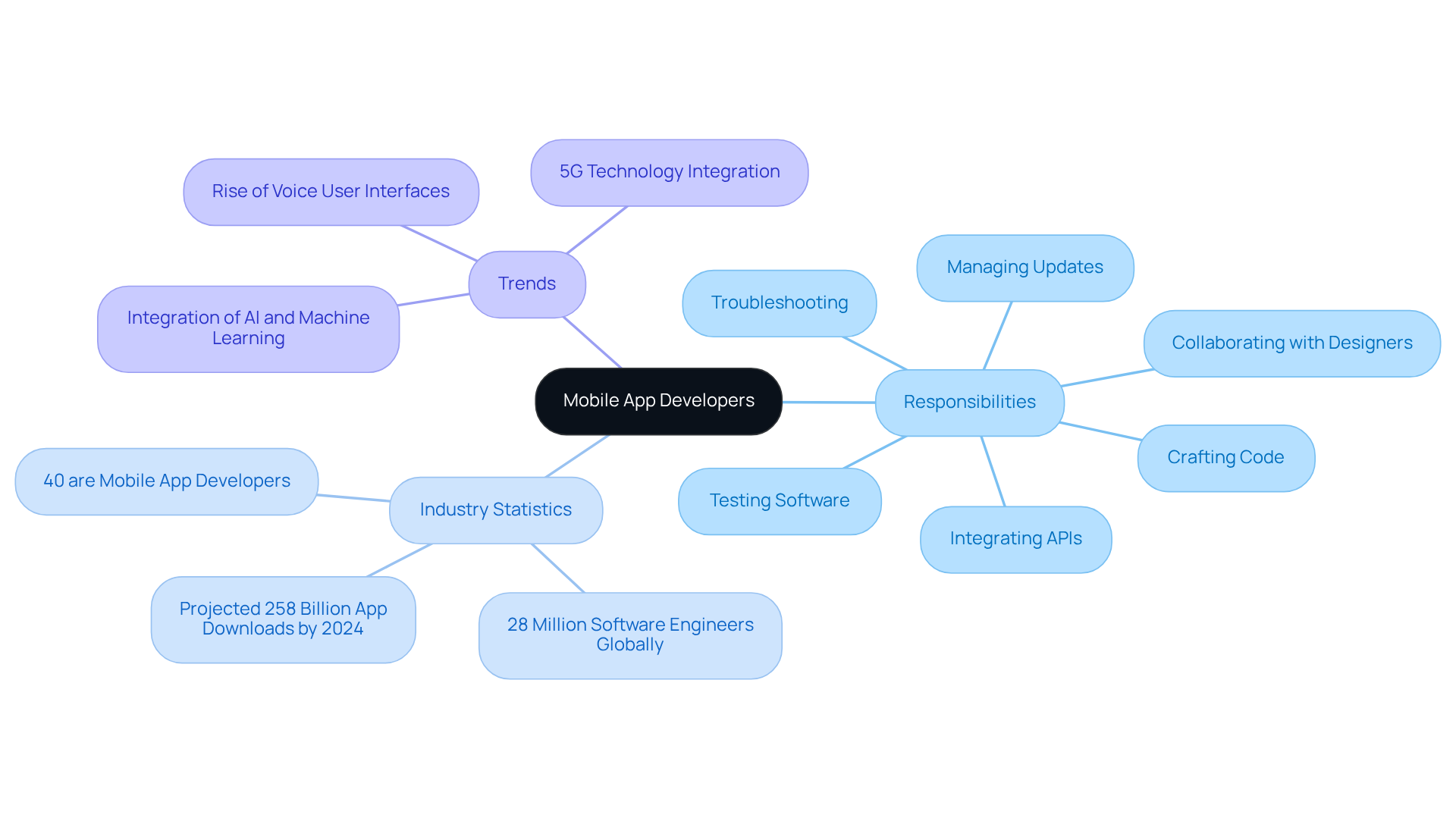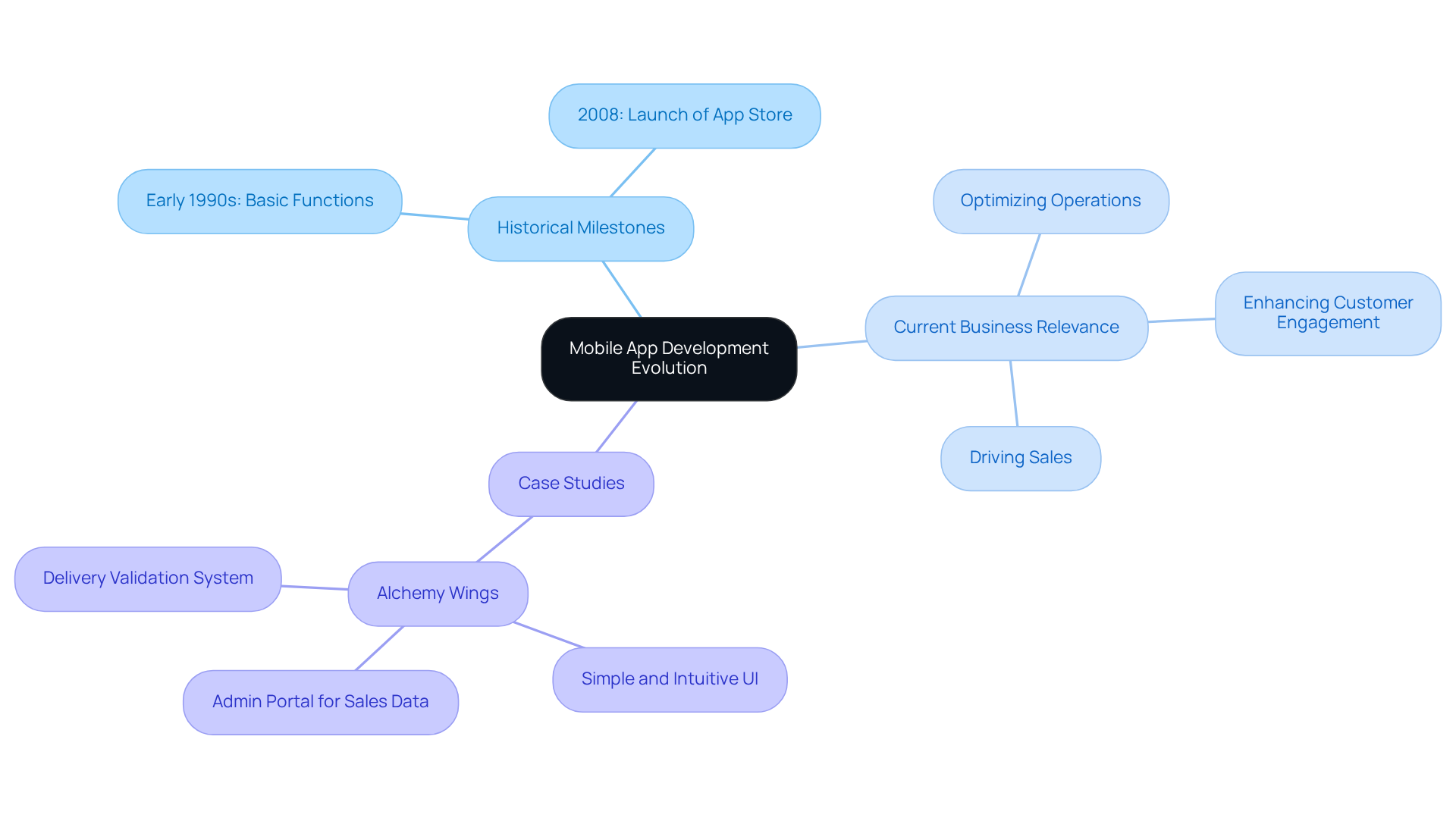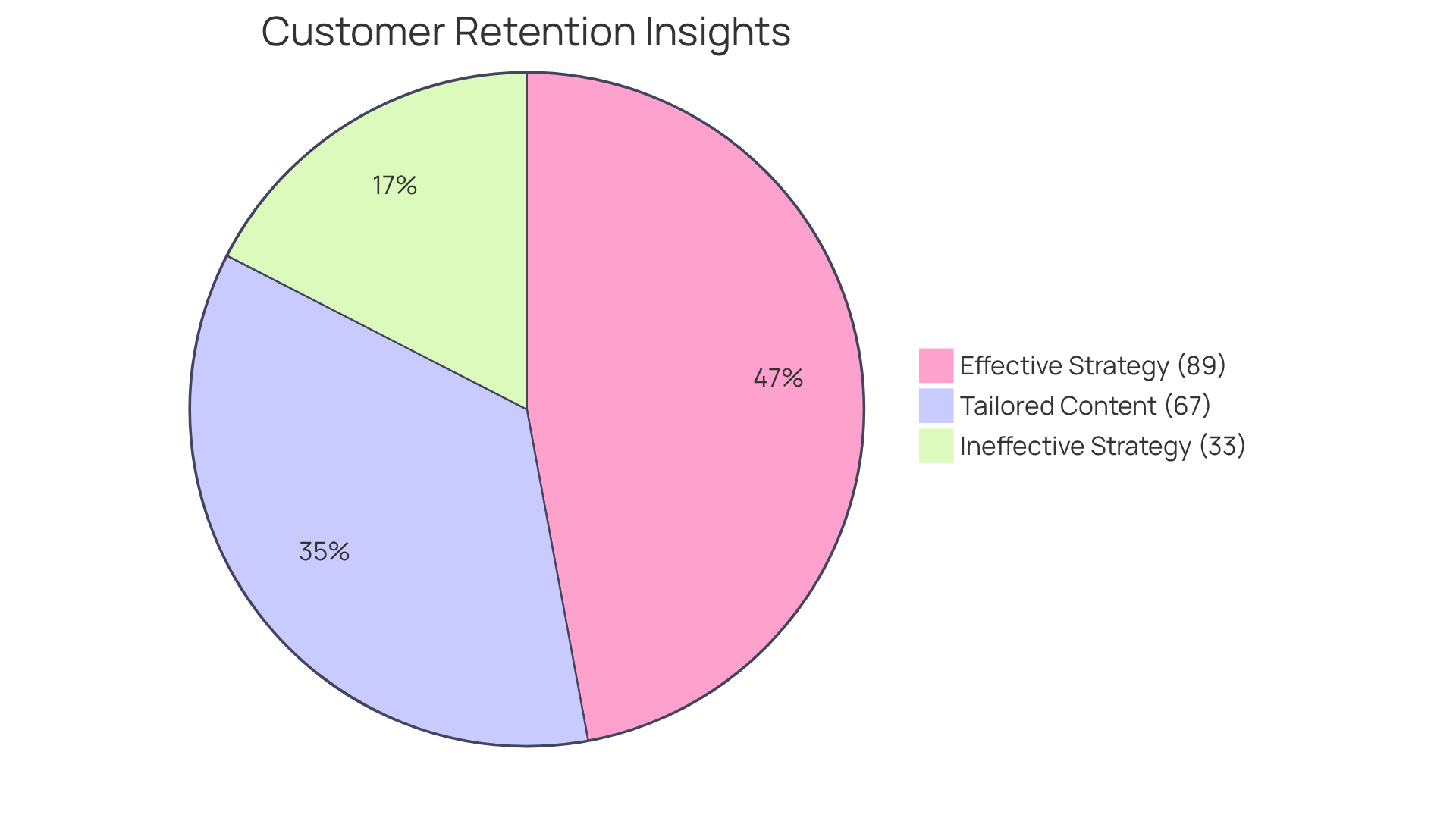AI
our blog
Understanding Mobile App Developers: Roles, Skills, and Impact

Overview
Mobile app developers are pivotal professionals tasked with the creation and management of software applications for smartphones and tablets. Their key roles encompass:
- Coding
- Collaboration on user interface design
- Rigorous software testing
This article underscores their profound influence on business success, illustrating that effective app development significantly enhances customer engagement and retention. Such improvements drive operational efficiency and align seamlessly with contemporary business strategies. In a landscape where technology dictates competitive advantage, the expertise of mobile app developers cannot be overstated.
Introduction
Mobile app developers serve as the architects of the digital realm, crafting applications that fuel user engagement and drive business growth in an increasingly mobile-centric society. As the demand for sophisticated applications surges, it becomes essential to understand the roles, skills, and impact of these professionals.
However, with rapid technological advancements and shifting market dynamics, how can businesses ensure they are leveraging the right talent to remain competitive? This article explores the evolving landscape of mobile app development, highlighting the critical skills and responsibilities of developers while examining their profound influence on business success.
Define Mobile App Developers: Key Roles and Responsibilities
Mobile app developers are professionals who create, construct, and oversee software for handheld devices, such as smartphones and tablets, and they play a crucial role in today’s digital landscape. Their primary responsibilities encompass:
- Crafting clean and efficient code
- Collaborating closely with designers to develop intuitive user interfaces
- Rigorously testing software to ensure optimal functionality and performance
As of 2024, approximately 28 million software engineers are active globally, with around 40% of them being mobile app developers, focusing significantly on either iOS or Android platforms. Developers employ programming languages such as Swift for iOS and Kotlin or Java for Android, ensuring that software is meticulously tailored to meet the specific requirements of each platform.
In addition to coding, application creators:
- Integrate APIs
- Manage app updates
- Troubleshoot issues throughout the development lifecycle
Their expertise is vital in transforming innovative concepts into practical solutions that not only fulfill user needs but also align with business objectives. As the demand for applications on smartphones continues to surge, with app downloads projected to reach 258 billion by 2024, the role of app creators becomes increasingly essential in delivering solutions that enhance user experiences and drive business growth.
Industry leaders emphasize that possessing exceptional app development expertise among mobile app developers is a significant advantage for both startups and established enterprises, underscoring the importance of skilled professionals in navigating the competitive app market. Vishal Bhatt, an industry administrator, asserts, "Businesses aiming to thrive in the fiercely competitive app market in 2024 must recognize the importance of data, trends, and projections when selecting an app developer."
Furthermore, the integration of AI and machine learning in mobile app development represents a key trend for 2024, driven by the demand for intelligent, data-driven solutions.

Contextualize Mobile App Development: Evolution and Business Relevance
Mobile app development has undergone a significant transformation since the early 1990s, when applications were rudimentary and served only basic functions. The launch of Apple's App Store in 2008 revolutionized the landscape, enabling developers to distribute and monetize their apps on a large scale. Today, applications are not merely tools; they are essential components of business strategies, providing companies with direct access to their customers and significantly enhancing user engagement.
As portable technology continues to advance, businesses increasingly depend on apps to optimize operations, enhance customer service, and drive sales. This reliance positions application development as a critical factor in modern business success, with companies leveraging innovative features and tailored experiences to meet user expectations and foster loyalty.
For instance, Studio Graphene developed a client-facing application and a responsive web platform for Alchemy Wings, showcasing a simple and intuitive UI that streamlines the ordering process. This platform also includes an admin portal for detailed sales data access and a delivery validation system for individual drivers, demonstrating how these specific features enhance user experiences and operational efficiency.
According to Nayan Sharma, 'With smartphones influencing our lifestyle, work, and shopping, a strong app presence is no longer optional—it’s essential.

Identify Essential Skills and Expertise of Mobile App Developers
Successful mobile app developers combine a robust set of technical and interpersonal skills to thrive in a competitive landscape. On the technical side, proficiency in programming languages such as Swift for iOS and Kotlin for Android is crucial for mobile app developers, along with familiarity with development frameworks like Flutter and React Native. For mobile app developers, understanding UI/UX design principles is essential for creating intuitive and engaging applications; effective UX design can enhance conversion rates by 400%. Furthermore, with the mobile app market anticipated to expand from $206.73 billion in 2022 to $407.31 billion by 2025, at a compound annual growth rate (CAGR) of 16.4%, mobile app developers must also be skilled at integrating emerging technologies like AI and machine learning to enhance user experiences.
Soft skills hold an equally crucial position. Effective communication, problem-solving abilities, and teamwork are essential for mobile app developers as they often collaborate with designers, product managers, and other stakeholders. Ongoing education is vital for mobile app developers in this swiftly changing field, as they must stay updated on the latest technologies and trends to remain competitive. In 2025, programming languages such as Python and TypeScript are anticipated to be in high demand, with Python especially desired in areas like data science and machine learning. This reflects the industry's transition towards data-driven solutions and scalable strategies. By mastering both technical and interpersonal skills, mobile app developers can significantly influence their projects and contribute to the overall success of their organizations.

Assess the Impact of Mobile App Developers on Business Success
Mobile app developers are essential for driving business success through the creation of applications that greatly enhance customer engagement and streamline operations. Companies that invest in well-designed applications often experience notable increases in customer retention and satisfaction, as these applications provide a direct channel for communication and service delivery.
For instance, businesses employing robust omnichannel engagement strategies retain 89% of their customers, in contrast to just 33% for those with less effective approaches. This statistic underscores the critical role of app development in achieving high retention rates. Furthermore, applications facilitate improved data gathering and analysis, allowing companies to refine their strategies based on user behavior and preferences.
As Raj Aggarwal, CEO of Localytics, aptly states, "the rich experiences anticipated from applications have established new standards and expectations for all digital media." Organizations that prioritize high-quality app development are better equipped to meet the evolving demands of consumers and enhance overall operational efficiency.
The smartphone is emerging as the new digital hub and a bridge to the physical world, highlighting the necessity for businesses to integrate mobile solutions as a fundamental aspect of their digital strategy. Additionally, 67% of consumers expect brands to automatically tailor content to their current context for a real-time personalized experience, further reinforcing the need for data-driven strategies among mobile app developers.

Conclusion
Mobile app developers play a crucial role in shaping the digital landscape, creating applications that not only fulfill user needs but also drive business success. Their expertise in coding, design collaboration, and software testing ensures that applications are functional, user-friendly, and aligned with business objectives. As the demand for mobile applications continues to surge, the importance of skilled developers in the competitive app market cannot be overstated.
This article highlights the evolution of mobile app development, illustrating how applications have transitioned from basic tools to vital components of business strategies. Key insights underscore the necessity of integrating emerging technologies such as AI and machine learning, the importance of robust technical and soft skills, and the significant impact of well-designed apps on customer engagement and retention. As businesses increasingly depend on mobile solutions, the role of app developers in enhancing user experiences and operational efficiency remains indispensable.
In conclusion, the future of mobile app development is promising, with ample opportunities for innovation and growth on the horizon. Companies must prioritize investing in skilled app developers to adeptly navigate the complexities of the digital age. By embracing the trends and skills outlined, businesses will not only position themselves for success but also ensure they meet the evolving expectations of consumers in a rapidly changing marketplace. The message is clear: the influence of mobile app developers extends well beyond coding; they are essential drivers of business performance and customer satisfaction in 2025 and beyond.









